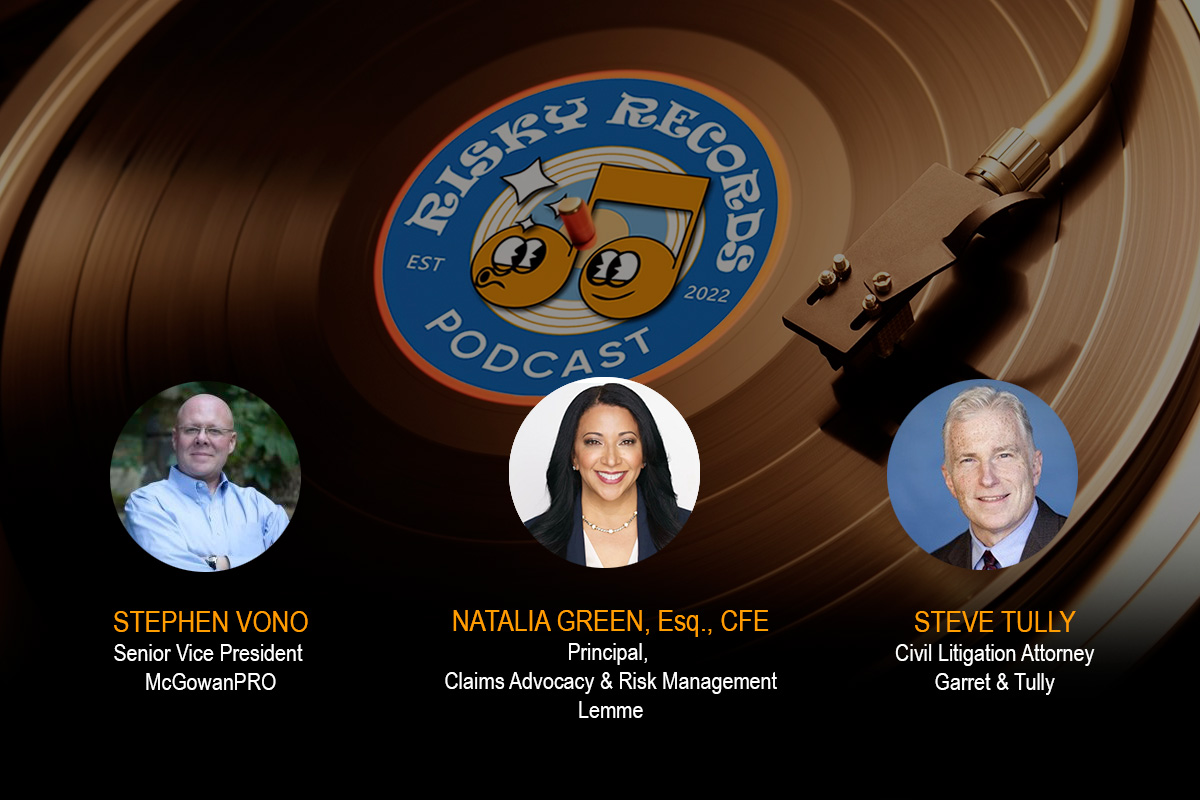In Episode 16 of Risky Records, we sat down with Steve Tully and Natalia Greene, two attorneys experienced in defending legal claims against CPAs, to discuss what to do if a lawsuit is brought against your CPA firm.
Because of the financial nature of the work, CPAs (auditors especially) are often targets of lawsuits. It can be easy to panic when a client sends a negative communication to a CPA. Whether it’s a strongly worded e-mail or a communication from a lawyer, it can be hard to know what the first step is to take.
If a claim manages to move forward in the process, through the stages of pre-litigation and mediation to an actual trial, finding a viable defense strategy is more than just the facts. CPAs need expert attorneys to guide them through how to tell a compelling “story” grounded in the evidence of the case and lead to favorable settlements and verdicts.
In this episode, we flesh out various strategies and defense theories in the event of a claim and how to reduce the risk of litigation in the first place.
The importance of seeking legal and insurance advice early
The first step after receiving a problematic communication from a client is to call your insurance broker. They can quickly apprise you of the seriousness of the situation and put you in touch with relevant legal counsel if your organization does not already have a legal team.
A good attorney can save you time and worry by advising you on the next steps and best practices. Additionally, they can refer you to a good mediator, which can be critical to arriving at a fair settlement and avoiding a court date. CPAs are experts in their fields, but tax law and other relevant legal areas are likely outside their purview. Working with experienced lawyers and insurance professionals is a shortcut to understanding the litigation process.
Also read: Engagement Letter Creep: Managing Expectations and Avoiding Risks
Is my case defendable?
According to Steve, most cases are defendable, whether they settle in pre-litigation or not. He emphasizes that “defensibility” is only one factor in evaluating a claim’s chances of going to trial and whether or not to settle. The other litigation risks include legal fees, reputational damage, and the inherent uncertainty of litigation.
Steve elaborates, “If you don’t settle either before or during litigation, you’re going to have 12 strangers… deciding your fate. So, getting rid of that risk has a value in and of itself—notwithstanding how strong the defense may be.”
Pre-litigation
Information is power in pre-litigation. With the right strategies in pre-litigation, you can avoid going to trial, reduce legal fees, and determine if settling is appropriate and, if so, a reasonable dollar amount.
Discovery
Discovery can be highly beneficial in terms of gathering intelligence. As Natalia explains, “This is a time where you can get information. You want to know what the other side is claiming, what they are saying you did, whether you agree with it or not. That’s free discovery. That’s early investigative information. So, you want as much information as you can get from the other party.”
She stresses that you must be careful with what information you share and request. If you discover a potential piece of malpractice in an e-mail, or at least something that could be spun that way by the opposing attorneys, you probably will not want to request the plaintiff to turn over their e-mails.
“There are so many other sources of information available out there,” says Steve. “If there’s companion litigation, if it’s a corporation and they sued their officers and directors, and there’s depositions. Free discovery. It’s already done.”
Steve provides an example of a plaintiff claiming it was unaware of the relationship between third-party stakeholders and was fined by the SEC as a result. The plaintiff attempted to pin the blame on the CPA firm. However, during discovery, Natalia found a flow chart in the public domain listing the third-party organizations and their exact relationship to the claimant.
Additionally, a defending attorney may draw on the expertise of an independent CPA to corroborate that your work papers, documentation, and practices meet the standard of care.
Mediation
More than half of the cases Steve mediates settle. This fact means that choosing an appropriate pre-trial mediator is essential to avoiding trial. Steve also points out, “A lot of times it’s not so much that you want a mediator that knows all about accounting or auditing, but you do want a mediator that has some level of experience in financial matters because most of the accounting cases deal with some sort of financial matter.”
There are many elements to a case. There can be various factions of stakeholders on both the defense and plaintiff sides, who may or may not be aligned. Steve mentions that business professionals are not immune to emotion. Steve advises, “You can’t view a case in a vacuum and just say, ‘We’ve got a really strong defense, and that’s the end of it.’ Because you may need to deal with some other dynamics to really resolve [the case].”
The unpredictability and risk of litigation
In many scenarios, avoiding a trial is the preferable course. Risks of litigation include:
- Reputational damage
- Public humiliation
- Lost time and resources spent outside of work
- The uncertainty of how a jury will rule
In other situations, there is no avoiding going to trial. In this scenario, it’s up to your defense counsel, stakeholders, and insurance broker to work together to tell a compelling story based on the evidence.
Learn more: 6 Risks that Can Get CPAs in Court and How to Navigate Them
Managing litigation risk with insurance
Unfortunately for CPAs, litigation risk is ever-present. Despite the best efforts of an accountant to meet the burden of care and live up to professional standards, they may find themselves on the wrong end of a lawsuit. Having the right insurance team and coverage in your corner is key to preventing and successfully mitigating the adverse effects of litigation.
McGowanPRO offers Professional Liability Insurance explicitly designed for CPAs, delivering extensive coverage that addresses their unique challenges and risks. Discover how this policy can safeguard you or your firm against the potentially significant expenses associated with a lawsuit. Get in touch to learn more.


